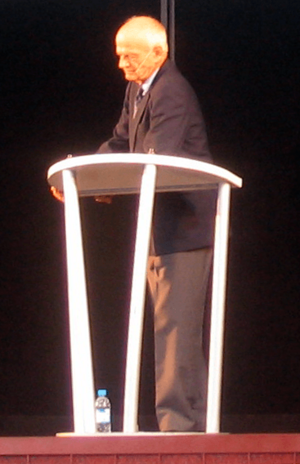Derek Bickerton facts for kids
Quick facts for kids
Derek Bickerton
|
|
|---|---|
| Born | March 25, 1926 |
| Died | March 5, 2018 (aged 91) |
| Alma mater | University of Cambridge (PhD 1976) |
| Known for | work in creole languages |
| Scientific career | |
| Fields | Linguistics |
| Institutions | University of Hawaii University of Leeds University of Guyana University of Cape Coast, Ghana |
Derek Bickerton (March 25, 1926 – March 5, 2018) was an English linguist and professor. He taught at the University of Hawaii in Manoa. He studied creole languages, which are languages that develop from a mix of different languages.
Based on his work, he believed that studying creole languages could help us understand how human language first developed. He created the language bioprogram hypothesis. This idea suggests that creole languages are similar because children who create them share a natural, inborn ability for grammar.
Bickerton also wrote several novels.
About Derek Bickerton
Derek Bickerton was born in Cheshire, England, in 1926. He graduated from the University of Cambridge in 1949.
He started his teaching career in the 1960s. First, he taught English Literature at the University of Cape Coast in Ghana. After studying linguistics for a year at the University of Leeds, he became a senior lecturer in linguistics at the University of Guyana from 1967 to 1971.
From 1972 to 1996, he was a professor of Linguistics at the University of Hawaii at Manoa. He earned his PhD in linguistics from the University of Cambridge in 1976. Derek Bickerton was the father of artist Ashley Bickerton. His other children are Julie Bickerton Bravata and Jim Bickerton.
His Research on Language
Derek Bickerton spent much of his career trying to answer big questions about language. He wanted to know:
- How did creole languages first appear?
- How do children learn language?
- How did language itself begin for humans?
In his book Language and Species (1990), he suggested that all these questions might be linked. He thought that language started with our ability to think using symbols. This ability then led to the development of formal syntax, which is how we put words together to make sentences.
He also wrote Adam’s Tongue (2009). In this book, he argued that human language is very different from how animals communicate. Animal communication systems (ACSs) usually only talk about things that are happening right now. For example, an animal might warn about a predator that is currently nearby.
Human language, however, can talk about things that are not present. This is called displacement. We can talk about the past, the future, or things that are far away.
Bickerton believed that this special ability came from how early humans lived. About two million years ago, our ancestors were good at finding food from large animal carcasses. They had to work together in groups to keep other predators away. He thought that communicating about these distant food sources, like a mammoth carcass miles away, helped language develop.
He suggested that imitating an animal, like a mammoth, could have been a way to share information. Over time, these imitative sounds became words. These words helped humans form "concepts," which are deeper ideas than what animals can understand.
Bickerton thought that these early words allowed for a "protolanguage." This was a simpler form of language, like a pidgin, that lasted for a very long time. Eventually, this protolanguage developed into the complex, structured language we use today, through a process he called Merge.
Derek Bickerton passed away in March 2018 at the age of 91.
 | Mary Eliza Mahoney |
 | Susie King Taylor |
 | Ida Gray |
 | Eliza Ann Grier |


